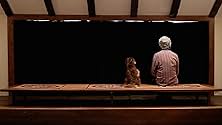When the world's most famous banned-from-work film-maker manages to defy the authorities which imposed the ban, and for the second time in the row, one cannot help but admire so much courage and the film in question automatically becomes an event. Unlike his previous documentary/essay 'This is not a film', which was smuggled out of Iran on a USB stick inside a cake, 'Pardé' lists actor/screenwriter Kambozia Partovi as co-director, so technically, Panahi didn't violate the ban; Partovi was, not surprisingly, awarded the Silver Bear for best screenplay.
Naturally there was a lot of anticipation at the Berlinale regarding 'Pardé', and just as naturally quite a few critics were disappointed with the result, which they described as being too cryptic. However, if you know Panahi's works, it will come as no surprise to you that 'Pardé' contains many symbols and metaphors which require much thinking, elaboration, and may be interpreted in contradicting, yet equally relevant ways.
As for the story: an elderly man arrives at a seaside villa and immediately proceeds to cover the windows with black cloth, so that no light can be seen from outside. He then releases a cute little dog from his sports bag... why did he keep it there? I'd humbly ask future reviewers from abstaining to describe the story much further, for this is one of those films which can only be enjoyed when you do not know too much about them.
'Pardé', filmed within three days, is a marvel of psychological film making and easily the most personal film Panahi has ever done. The only film I remember in which a film-maker conveys so much of his interior to the spectator would be Polanski's 'Le Locataire'. Of course, Panahi's film, shot on a shoestring budget inside his own holiday house, cannot compare in terms of visual opulence, but given the modest means at his disposal, it manages to share a surprisingly vast scope of ideas and emotions - if you are familiar with his situation and previous work. If you are not, there's a good chance that you will find this film too opaque.






















